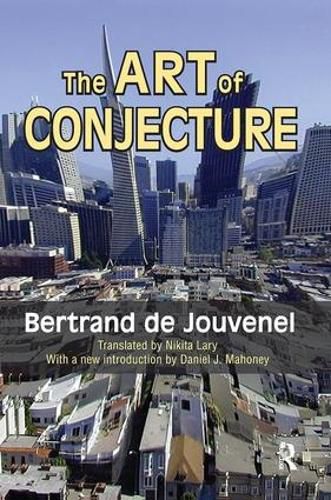Readings Newsletter
Become a Readings Member to make your shopping experience even easier.
Sign in or sign up for free!
You’re not far away from qualifying for FREE standard shipping within Australia
You’ve qualified for FREE standard shipping within Australia
The cart is loading…






Commissions of experts regularly meet to reply to questions such as: What will be the population of the country, or even of our planet, in ten, fifteen or twenty-five years? In what proportion will production have increased, what modifications will its composition and utilizations have undergone? The attraction of efforts to forecast the future continues. That is a fact. How does it proceed? That is a problem, one on which de Jouvenel focuses on in this book.
The Art of Conjecture clearly explains what the study of the future can mean. De Jouvenel emphasizes the logical and political problems of forecasting and discusses methods in economics, sociology, and political science by which the future can be studied. More importantly, he discusses the fallacies to which the study of the future is peculiarly likely to give rise. The author argues that it is natural and necessary for the population to have visions of the future. Without this, he states, we would only be able to set one opinion of the future against another. If the origins and meanings of these predictions remained obscure, only the event could decide among the opinions.
If any man can be said to have created the serious study of the future in our time, it is Bertrand de Jouvenel. Futuribles, a periodical he created, continues to represent a major turning point in contemporary social science. Jouvenel aimed to show how the art of conjecture could inform prudential judgment and allow citizens and statesmen to detect troubles before they arise.
$9.00 standard shipping within Australia
FREE standard shipping within Australia for orders over $100.00
Express & International shipping calculated at checkout
Commissions of experts regularly meet to reply to questions such as: What will be the population of the country, or even of our planet, in ten, fifteen or twenty-five years? In what proportion will production have increased, what modifications will its composition and utilizations have undergone? The attraction of efforts to forecast the future continues. That is a fact. How does it proceed? That is a problem, one on which de Jouvenel focuses on in this book.
The Art of Conjecture clearly explains what the study of the future can mean. De Jouvenel emphasizes the logical and political problems of forecasting and discusses methods in economics, sociology, and political science by which the future can be studied. More importantly, he discusses the fallacies to which the study of the future is peculiarly likely to give rise. The author argues that it is natural and necessary for the population to have visions of the future. Without this, he states, we would only be able to set one opinion of the future against another. If the origins and meanings of these predictions remained obscure, only the event could decide among the opinions.
If any man can be said to have created the serious study of the future in our time, it is Bertrand de Jouvenel. Futuribles, a periodical he created, continues to represent a major turning point in contemporary social science. Jouvenel aimed to show how the art of conjecture could inform prudential judgment and allow citizens and statesmen to detect troubles before they arise.